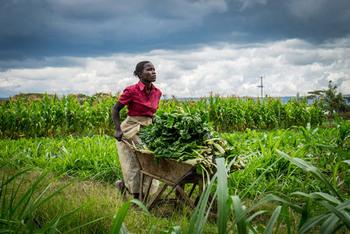Context
The Southern African Development Community (SADC) region is strongly affected by the impacts of climate change. Extreme weather events such as droughts, floods and cyclones reduce and threaten agricultural productivity and, according to climate scenarios, their frequency and intensity will continue to increase. This presents a serious threat to food security and livelihoods, particularly among poor segments of the population in rural areas.
The Centre for Coordination of Agricultural Research and Development for Southern Africa (CCARDESA) is the programme’s implementation partner and coordinates agricultural research and development in the SADC region.
Objective
CCARDESA has increased the capacities of SADC member states to integrate climate change aspects into agricultural programmes and investments.
Approach
The programme supports the implementation of climate-relevant elements of the SADC Regional Agricultural Policy and strengthens the the capacity of CCARDESA to act as a knowledge broker, coordinator and moderator for agricultural research and development.
The programme’s action areas are:
1. Regional dissemination of knowledge for climate change adaptation in agriculture and climate-smart agriculture
2. Capacity building to climate-proof agricultural value chains
3. Capacity building to access climate finance
Results
Since 2016, CCARDESA and ACCRA have achieved the following:
- CCARDESAs information and knowledge management system, including the Southern African Agriculture Information Knowledge System (SAAIKS) presents itself with a revamped website, discussion groups and social media applications. Information on how to improve climate change adaptation in agriculture is available to a wide range of stakeholders across the region. 700 new climate relevant resources are uploaded. A mobile application on climate-smart agriculture to reach out to extension services was launched. Website and SAAIKS users have increased from 361 to 4,688 and discussion group members from 207 to 3,568;
- 13 knowledge products on climate-smart agriculture were published with more on the way;
- Climate change and agriculture relevant training courses, such as climate proofing, climate risk analysis, assessment of post-harvest losses, proposal writing, climate finance and gender reached 2,036 individuals (1,251 males and 785 females) across SADC who are now applying these new skills;
- Three Member State projects on climate-proofing agricultural value chains produced climate vulnerability analyses, piloted and prioritised suitable practices and developed knowledge products, feasibility studies and investment proposals (1. sorghum systems with Lesotho & Botswana in partnership with the Rural Self-Help Development Association; 2. maize-legume systems with Malawi, Zambia and Zimbabwe in partnership with the International Maize and Wheat Improvement Centre and 3. Herding for Health on livestock and rangelands with Botswana, Lesotho, Mozambique, Zambia and Zimbabwe in partnership with Conservation International and Peace Parks Foundation). Through the Herding for Health programme the Southern African Wildlife College introduced an Eco-Ranger programme and celebrates 52 graduates;
- CCARDESA developed its first long-term strategy and increased its visibility on climate change matters at several regional, continental and global events. New and existing strategic partnerships with a range of regional and international research and development organisations were strengthened to jointly increase resilience to climate change and mobilise resources; and
- The Green Climate Fund Readiness Project strengthened the capacity of Botswana’s National Designated Authority, line ministries, private sector, academia and civil society on GCF modalities and on how to develop a GCF country programme in line with the country’s development and climate change priorities in an inclusive manner.
